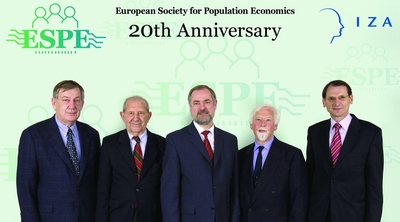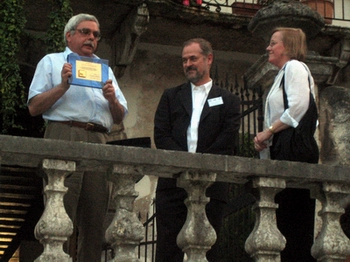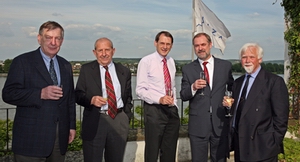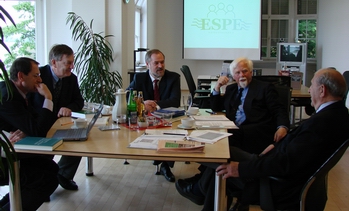| |
|
|
20th Anniversary: European Society for Population Economics (ESPE)
|

|
|
Researching the Major Social Challenge of Our Time |
 | 20 years after - ESPE's first Executive Committee meets again at IZA:
Pestieau, Schmitt-Rink, Zimmermann, van Praag, Ritzen (left to right) |
On June 22-24, 2006, European population economists gathered for their 20th annual congress in Verona, Italy. Traditionally this conference is not only concerned with the exchange of research on demographic processes (e.g. marriage, fertility, migration, and mortality) and their political implications, but it includes a variety of related disciplines such as household economics, labor economics, public economics, and health economics. The agenda of this year's meeting with about 300 participants included more than 200 individual presentations. During the event, ESPE President Patricia Apps (University of Sydney and IZA) and President-Elect Barry R. Chiswick (University of Chicago at Illinois and IZA) presented a recognition plaque to IZA Director and ESPE co-founder Klaus F. Zimmermann "for his inspiration and leadership in creating the European Society for Population Economics and for 20 years of dedicated guidance to ESPE." |
|
 | ESPE President Patricia Apps and President-Elect Barry
Chiswick (left) awarding the plaque to Klaus F. Zimmermann
|
During the two decades of its existence, the European Society for Population Economics (ESPE) has developed into a highly renowned and internationally influential scientific association. The Journal of Population Economics, established with the help of the Society, has become one of the leading academic journals in economic science worldwide. IZA hosts the internet homepages of ESPE (www.espe.org) and the Journal of Population Economics (www.popecon.org) as well as the editorial office of the Journal.
Demographic phenomena greatly shape today’s scientific and political debates. Due to declining fertility rates and instable family structures, European populations are shrinking. As the labor force is aging and the funding problems of pension and health insurances are growing, governments find it increasingly difficult to keep up the provision of public goods without resorting to high budget deficits. New forms of intergenerational unfairness are evolving. Demographic, political, and economic factors require major adjustments that are reflected by increasing international migration. The migration flows, in turn, create a wide array of challenges for society – and, as such, for scientific research. |
|
Demographic problems have too long been neglected
Looking back at the academic debate 20 years ago, it is disturbing to note that the key problems, as well as their potential solutions, were already known back then. In view of these problems and the need to investigate them scientifically, the foundation of ESPE had long been overdue at the time. That the political practice in most countries has not sufficiently advanced since then, is therefore not due to a lack of forethought among economists, but at most to their failure to convey their insights adequately to policymakers and the public. The problem must also be attributed in part to the long-term nature of demographic effects. Even 20 years after the problematic demographic processes have been noticed, their consequences are only slowly beginning to show. And it will take another 20 years until their effects have fully and irreversibly come to bear. |
|
 | | ESPE founding fathers celebrating the anniversary |
It was not a mere coincidence that ESPE’s birthplace was in the border triangle between Belgium, Germany, and the Netherlands. In the Continental Europe of the 1980s, the Centre for Operation Research and Econometrics (CORE), founded by Jacques Drèze in Louvain-la-Neuve, was the only prominent research center. At the time CORE initiated the foundation of the European Economic Association (EEA), which held its first annual congress in Vienna in 1986. The establishment of the EEA was part of a general awakening with regard to European research, which has since then improved the competitiveness of economic research institutions in Europe vis-à-vis their dominant North American counterparts. The Netherlands and Germany were then among the most active European nations conducting research in population economics. |
|
The early days of ESPE
For Germany, demographic change had long been a serious challenge. But the country still lacked research capacity and a platform for scientific and political exchange. In the early 1980s, the German Population Association (Deutsche Gesellschaft für Bevölkerungswissenschaft, DGBw) was a forum for interested German economist including Gunter Steinmann (University of Paderborn, now University of Halle), Gerhard Schmitt-Rink (University of Bochum, now Professor Emeritus in Wiesbaden), Bernhard Felderer (University of Cologne, now Institute for Advanced Studies, Vienna), and Klaus F. Zimmermann (University of Mannheim, now IZA und University of Bonn, also President of the German Institute for Economic Research, DIW Berlin). Starting in 1982, Zimmermann chaired the population economics section founded on his initiative within the DGBw, while Felderer headed the population economics section of the German Economic Association (Verein für Socialpolitik, VfS) as of 1985. On the national level, therefore, German population economists had been well mobilized and organized by the mids of the 1980s. |
|
|
After the attempt to integrate the group of economists into the International Union for the Scientific Study of Population (IUSSP) had failed, the idea to create an own international learned society began to take shape. In 1986, Zimmermann, while being a Research Fellow at CORE, became aware of the preparations to establish the EEA. He also got in contact with Pierre Pestieau (University of Liège and CORE). On his weekly commute between Louvain-la-Neuve and Mannheim, Zimmermann regularly met with Schmitt-Rink in Wiesbaden to discuss the foundation of a European learned society. Step by step, on an old typewriter in Schmitt-Rink’s kitchen, the statutes of a European Society for Population Economics were put together. Back at CORE, Zimmermann enticed Pestieau to support the idea of a new society. Together they managed to attract Bernard van Praag (University of Rotterdam, now University of Amsterdam) to take a prominent part in this initiative. |
|
 | | ESPE founders still actively engaged in the academic debate |
ESPE remains unparalleled worldwide
As early as in fall 1986, the project was institutionalized during a conference on “Demographic Change and Economic Development” organized by Alois Wenig (University of Hagen, now University of Halle) and Zimmermann at the University of Hagen. Bernard van Praag was elected President for the 1986/87 term, Pierre Pestieau President-Elect, Gerhard Schmitt-Rink Treasurer and Klaus F. Zimmermann Secretary. They constituted the first ESPE Executive Committee. President and President-Elect were elected for a one-year term, Treasurer and Secretary for three years. The President-Elect would automatically become President for the next term. Jo Ritzen (University of Rotterdam, now University of Maastricht) was chosen as the organizer for the first annual meeting, which took place at the University of Rotterdam on September 17-19, 1987. Thanks to a perfect organization, the meeting was highly successful and productive. Many of the first congress participants have meanwhile produced important research output, often as a result of fruitful collaboration. |
|
|
The foundation of the Society has greatly contributed to establishing population economics as a recognized subdiscipline of economic science. The fact that ESPE has remained the only international learned society of its kind until today underscores its special role and significance. |
|
| |
About the ESPE Founding Fathers |
Bernard M. S. van Praag (67, University of Amsterdam, ESPE President 1986/87)
After completing his studies at the University of Amsterdam, Bernard van Praag’s academic career included stints at the Free University of Brussels, the University of Leiden, and the Erasmus University Rotterdam before he returned to the University of Amsterdam. Van Praag became the first President of ESPE in 1986/1987. At the time, the Dutch economist was a Professor at the Erasmus University Rotterdam. In 1992 he moved back to the University of Amsterdam, where he is still an active faculty member. In addition to his role as the co-founder of ESPE, van Praag was also the Founding Director of the renowned Tinbergen Institute. Between 1988 and 1992, he was a member of the Dutch Scientific Council for Government Policy, a prominent advisory body for the Dutch government on long-term policy issues. He was the responsible council member for the report that initiated the demographic discussion on the aging society in the Netherlands. In 1999 van Praag was elected a member of the Royal Dutch Academy of Sciences. He also served as Managing Director of the Foundation for Economic Research (SEO, Amsterdam). His research, which has been published in a wide array of top international journals, deals not only with demographic questions, but also with issues of labor and health economics.
Pierre Pestieau (62, University of Liège, ESPE President-Elect 1986/87, ESPE President 1988)
After studying philosophy, sociology, and economics at the University of Louvain, Pierre Pestieau received his Ph.D. in economics from Yale University in 1972 and became Assistant Professor at Cornell University. Since 1975, he has been Full Professor of Economics at the University of Liège, where he is also President of the Centre de Recherche en Economie Publique et de la Population (CREPP). Since the beginning of his career, Pestieau has continually produced important contributions to population research. He has been one of the most active supporters of ESPE. His research interests also include public economics and social insurance. He has held visiting positions at renowned European universities as well as in Peru, Canada, and the United States. Pestieau has published a number of books and articles in major international journals. The Belgian economist is a Co-editor of the Journal of Public Economics and an Associate Editor of the Journal of Population Economics. In 1988 Pestieau became President of ESPE. In 1989 he received the Francqui Prize, the highest scientific award in Belgium, for his contributions to the advancement of economic science.
Gerhard Schmitt-Rink (80, Ruhr University Bochum, ESPE Treasurer 1986-1989)
ESPE Founding Member Gerhard Schmitt-Rink looks back on a long career as a professor at the renowned economics department of the Ruhr University Bochum, where he was active from 1970 until he became a Professor Emeritus in 1991. Schmitt-Rink also held various visiting positions in the United States, China, India, Singapore, and Afghanistan. As a Professor Emeritus he continues relentlessly to promote academic science, for instance as the Founding Dean of the economics department at Martin Luther University Halle-Wittenberg and a Founding Board Member of the Academies of Business and Administration in Wiesbaden and Cologne. His numerous publications on such topics as consumption dynamics, international trade, distribution and growth theory, as well as macro and population economics, reflect his broad research focus. His work has contributed greatly to the success of ESPE.
Klaus F. Zimmermann (53, IZA, DIW Berlin, University of Bonn, Free University of Berlin, ESPE Secretary 1986-1992, ESPE Conference Organizer, Mannheim 1988, ESPE President-Elect 1993, ESPE President 1994)
As an expert for research in population economics, Klaus F. Zimmermann headed the Population Economics Section and served as Council Member for the German Population Association (DGBw) before co-founding the European Society for Population Economics in 1986. As ESPE Secretary (until 1992), President-Elect (1993), President (1994), and Member of the ESPE Council (1995-1998 and 2004-2006), Zimmermann has decisively shaped the advancement of ESPE as the most important international association of population economists. After completing his studies at the University of Mannheim and taking up visiting positions at the Centre for Operations Research and Econometrics (CORE), University of Louvain-la-Neuve, and the University of Pennsylvania, Philadelphia, Zimmermann became Professor of Economics at the University of Munich (1989-1998). Since 1998, he has been Professor of Economics at the University of Bonn, and since 2001 also Honorary Professor at the Free University of Berlin. In addition to his tasks as Director of the Institute for the Study of Labor (IZA) and since 2000 as President of the German Institute for Economic Research (DIW Berlin), he is a member of various policy and scientific advisory groups and continues to conduct research, especially on the labor market implications of migration. Since 1988, he has been Managing Editor and Editor-in-chief of the Journal of Population Economics. His publication record includes 33 books and nearly 200 articles in renowned international journals and collected volumes.
Jo Ritzen (60, President of the University of Maastricht, ESPE Conference Organizer, Rotterdam 1987)
Prior to the foundation of ESPE, Jo Ritzen had already achieved an impressive academic career. After stints and the University of Nijmegen, the University of California at Berkeley, and the Robert M. LaFollette Institute of Public Affairs at the University of Wisconsin-Madison, he became a professor at the Erasmus University Rotterdam when ESPE was established. He then opted for a political career: Between 1989 and 1998, he held several cabinet positions in the Dutch government, including Minister of Education, Cultural Affairs, and Science. As the Minister of Education, he was one of the longest-serving cabinet members worldwide. During his term in office, he initiated important reforms of the Dutch educational system. Subsequently, Ritzen accepted leadership positions at the World Bank, serving as Vice President of the Development Economics Department (1999-2001) and Vice President of the Human Development Network (2001-2003). Since 2003, Jo Ritzen has been the President of the University of Maastricht. |
|
| |
|
|
|
|